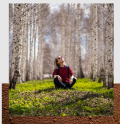
In this module we will explore what ecotherapy is and how it is used. The theories and benefits of ecotherapy are also explained in detail.
- Teacher: Sabine Wiemann

In this module we will look at the potential benefits of ecotherapy for people with substance use disorders (SUDs), the types of experience and skills they may need, how and when ecotherapy should be introduced into the therapy process, and common practical challenges that may arise when using ecotherapy in practice.

Generally, when planning activities, whether they are indoor or outdoor, the motivation factor of the participants is key; in order to obtain flow, enjoyment, acquire new skills etc., the participants need to see a meaning with the activity in order to fully emerge and participate. One way to motivate the participants is by asking about their interests, their life story and their goals of life, and connect it to an activity.

Working with people with Substance Use Disorder (SUD) is not always easy. Due to the characteristics of SUD sufferers and the challenges they face, different factors and considerations need to be taken into account by professionals when dealing with them.
In this module you will find information on some considerations to take into account when trying to prepare and implement any ecotherapy activity with people with substance use disorder.
- Teacher: Sabine Wiemann

In this module we present 10 practical ecotherapy activities that can be used by professionals (e.g. counsellors, social workers, therapists, etc.) in their work with people with substance use disorders (SUDs) as well as in addiction prevention activities.
